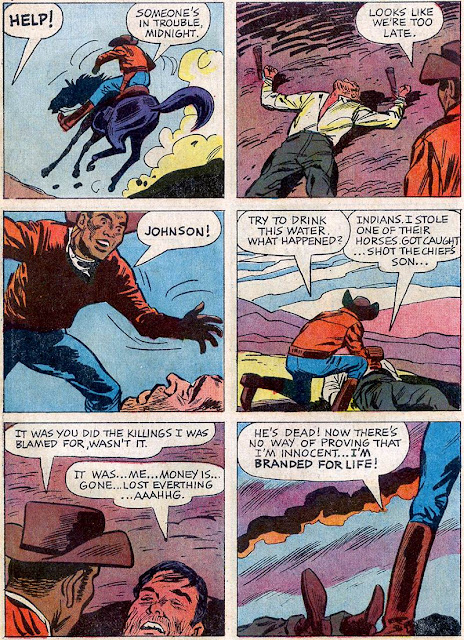The duo took the character to Dell's editor-in-chief, Helen Meyer - she loved the concept and put the book into production. In December, the first issue shipped out.
Lobo's tale opens as the Civil War closes...
Lobo establishes himself as both true to his desire for peace and a man with nothing to prove as he avoids one saloon fight, and simply walks away when another breaks out when Ace tries to provoke him, despite being called a coward for not wanting to fight.
As expected, while he chases after Johnson the others pin the crime on him, giving the only name they know - LOBO.
Lobo finds himself "wanted for every unsolved killing and robbery this side of the Mississippi." While pondering his options, a near miss shot leads him to find the man he avoided fighting back in the bar, Red Carson. Red explains that "Ace and Smoker hung around after the killing you did and ended up robbing the bank." Lobo corrects him about the killing, and Carson explains why he was out here in the first place -
After a brief fight, Lobo captures the trio and rides them back to town...
Lobo gives the dead man a proper burial and heads back to the only place he isn't hunted, the old timer's cabin, only to find the old man on his deathbed -
Perhaps the most truly remarkable aspect of Lobo was the lack of racial stereotypes. He wasn't an escaped slave or any of the standard tropes one might expect. In fact, at no point is his race even mentioned - he is simply a man, marked only by the colour of his skin. That's a concept that seems to elude so many creators even today. And one that was far too advanced for the time...
If one was telling the story of comic books in standard comic book form, one of the greatest super-villains of the tale would be Distribution.We've already seen how distribution killed efforts by small publishers to put out their own comics featuring black heroes. Distribution did terrible things to the industry over time - killing even Jack Kirby & Joe Simon's company, preventing them from potentially bringing about what was eventually the Marvel Age of comics. And distribution is an even bigger enemy here.
Lobo was cancelled with issue #2 for one very simple reason. Over 90% of the bundles were returned - most unopened. The dealers refused to put a title starring a black man on the stands, and readers were never given the option to buy it. So vitriolic was their reaction that the vendors often returned all the comics bundled with Lobo, crippling Dell's financial flow for that month. Tragically, a measurable portion of the population today is still driven by that fear that acknowledging different others somehow diminishes themselves.
In his second and final episode, Lobo faces off against a land baron styling himself The King -
 |
| While this exact scene may not appear in the comic, it's close enough - they do duel with a variety of medieval weapons. |
Next time, we jump back to the 1940s -
pages by D.J. Arneson and Tony Tallarico for Lobo #s 1 & 2 (1965, 1966)
















































